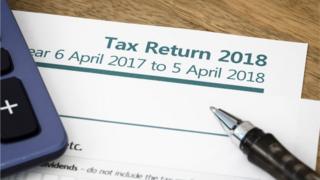Taxpayers treated unfairly by HMRC, says House of Lords report
 Image copyright
Image copyright
Getty Images
Greater powers given to HMRC to tackle tax avoidance and evasion are undermining the rule of law and justice, warns a House of Lords report.
The Economic Affairs Committee said HMRC has been granted some broad, disproportionate powers without effective taxpayer safeguards.
High penalties, designed to deter taxpayers from appealing, are a tax on justice, the committee claimed
It has demanded a review of the oversight of HMRC and its powers.
Careful balance
Lord Forsyth of Drumlean, chairman of the committee, said: “HMRC is right to tackle tax evasion and aggressive tax avoidance. However, a careful balance must be struck between clamping down and treating taxpayers fairly.
“Our evidence has convinced us that this balance has tipped too far in favour of HMRC and against the fundamental protections every taxpayer should expect.”
The Committee’s report warned that some of the powers “disproportionately affect” unrepresented and lower income taxpayers.
It said it took some “disturbing evidence” on the government’s approach to the loan charge, a fee which was brought in to combat “disguised” pay schemes.
Under these schemes, workers were paid by way of a loan, an arrangement that was intended to avoid tax and National Insurance contributions for the employee.
Case study: ‘She has no means of paying it’
One case presented to the committee concerned a social worker who was made redundant by her local council.
The evidence reported: “It had a farewell party on the Friday, and on the Monday it said ‘If you join this agency and use the scheme, we will re-engage you as a contractor.’
“She was re-engaged as a contractor for five years but at the end of the five years, the council told her it would re-employ her as an employee, which it did.
“She was unaware of what was going on. She now faces a loan charge equal to probably a year and a half’s salary.
“She has no means of paying it.”
“This is devastating the lives of middle and lower income individuals, from the private and public sector (including the National Health Service) who used disguised remuneration schemes, in many cases being required to do so by their employers,” said Lord Forsyth.
“The charge is retrospective in its effect, claiming tax from years which should be closed to enquiry.”
Review loan charge cases
The report recommends that HMRC should urgently review all loan charge cases where the only remaining consideration is the individual’s ability to pay, and establish a dedicated helpline to give those affected by the loan charge advice and support.
It said action should take place “well in advance” of the loan charge coming into effect in April 2019.
The committee has also recommended that Parliament considers how it can improve the scrutiny of the powers being given to HMRC and oversight of how it carries out those powers.
Other report findings and recommendations include:
- Consideration should be given to widening the remit of the Adjudicator’s Office, and to oblige HMRC to follow its recommendations
- The government should withdraw clauses 79 and 80 of the Finance Bill, which would extend HMRC time limits to assess offshore matters to 12 years
- The government should withdraw its proposal, for which consultation closed in October, to remove oversight of the tax tribunal from HMRC access to information about taxpayers from third parties
- Penalties associated with General Anti-Abuse Rule and Follower Notices restrict access to justice, and should be abolished
- The government should legislate to give the First-tier Tribunal (Tax) the power to conduct judicial reviews.
- The Treasury should assess whether HMRC is adequately resourced to fulfil its Charter obligations in the next Spending Review.
Aggressive tax avoidance
A Government spokesperson responded: “We’ve taken unprecedented action to crack down on avoidance and evasion, making sure people pay their fair share of tax and securing funding for our vital public services.
“Parliament has given HMRC powers it needs to tackle businesses and individuals who do not pay their fair share, and it uses them responsibly and subject to appropriate checks and balances.
“On the loan charge in particular, it is important to bear in mind that disguised remuneration schemes are aggressive tax avoidance structures that allowed some people to avoid the taxes that Parliament requires them to pay.”



